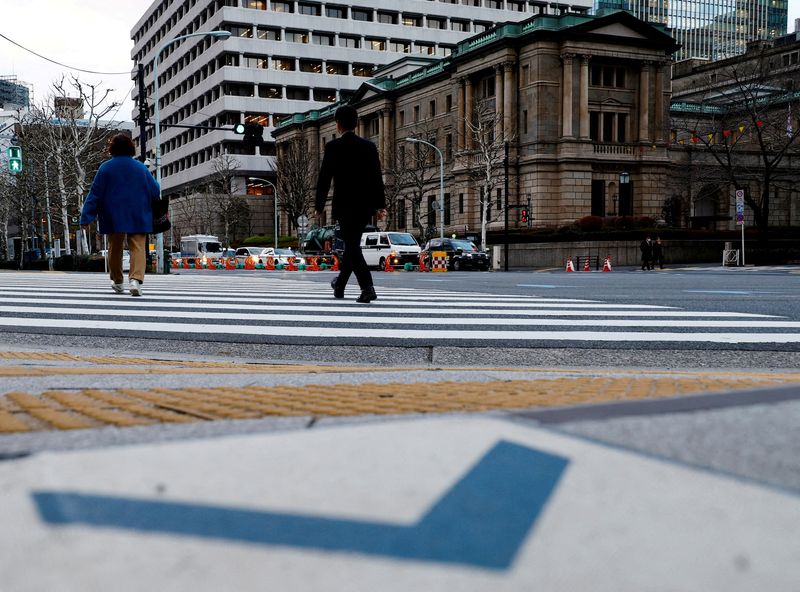Select Language

By Tom Westbrook
SINGAPORE (Reuters) - Barely weeks after Japanese stocks broke three-decade highs, the country's financial markets are hurtling toward another phenomenon not seen for the best part of a generation: rising interest rates.
Bankers are attending remedial classes on what to do when rates move and trading rooms are setting up for moribund derivative markets to spring to life -- as they have begun to do.
Their pricing implies a matter of months at the most before the last bastion of a decades-long monetary policy experiment with negative short-term rates falls. An exit by the Bank of Japan is expected by June, with an even chance that rates will rise to zero next week.
Such a move, up 10 basis points, would be small, leaving traders to focus on broader signals: whether any change is implemented immediately, or later, and whether the BOJ winds down its enormous buying programme for assets ranging from Japanese government bonds to listed equity funds.
The symbolism is also heavy as Japan seeks to leave behind "lost" years marked by deflation and reawaken the fourth-biggest economy in the world as a destination for investment -- a change already rippling through corporate Japan and global markets.
"I personally think this is going to be the beginning of a new era," said Keita Matsumoto, head of financial institutions sales and solutions at Citigroup Global Markets Japan.
"It's a fundamental shift in peoples' mindset," he said, one that may take five or 10 years' adjustment as the economy changes.
Some of the biggest implications may be in Japan's 1.3 quadrillion yen ($8.7 trillion) government debt market.
Matsumoto said investors have positioned to benefit from selling of short-dated paper since a rise in central bank deposit rates would quickly draw banks' capital out of bonds and into cash.
Should a bigger policy shift drive longer-term rates up sharply, Japanese investors -- who own some $2.2 trillion in foreign debt -- might also lose their appetite in favour of paper closer to home, which would drag on global bond markets
In foreign exchange, a market that is heavily short the yen has reversed a little in recent days and must adjust to paying interest, albeit small, on the Japanese currency.
Equity investors have been snapping up bank shares on bets loans and margins will grow, though in the last few days trade has turned nervous as the potential policy shift draws near.
The Nikkei, which made a record high above 40,000 last week, posted its sharpest fall in five months on Monday.
"There has been a fair degree of excitement about the Japanese economy and monetary policy ... becoming 'more normal' and like the other countries," said Niraj Athavle, J.P. Morgan's head of sales and marketing in Singapore.
"The equity market, because of the fact that the Japanese are moving out of a deflation forever situation ... is beginning to attract a lot of attention - bond markets and swap markets will follow as Japan tends to become a more normal economy."
SWEET SPOT
Previous hiking cycles in Japan took place under such different circumstances that comparisons are tricky.
In 1989-90 it raised rates by more than 300 basis points, bursting a property bubble and crushing the economy and stock market for a decade. In 2006, an attempt to end a zero-rate policy fell flat as inflation couldn't be sustained.
This time investors and policymakers both point to higher wages and changes in companies' attitudes as new elements. Pay negotiation data due on Friday, before the BOJ meets, can move markets especially if it surprises to the upside.
"Markets still underprice any long-term changes in Japan," said Ales Koutny, head of international rates at Vanguard, who is increasing short exposure to Japanese government bonds.
"A wage number high enough that supports consumption could focus minds on a potential longer hiking cycle."
He sees the five- to 10-year tenors as most vulnerable if the BOJ winds back its support and says 10-year yields could surpass 1% and in the longer term trade like German bunds - which yield 2.3% - if wages, consumption and inflation start to reinforce one another.
Two-year Japanese yields, which track short-term rate expectations, have hit 13-year highs at 0.2%, five-year yields and 10-year yields are around multi-month highs of 0.4% and 0.77%, respectively. [JP/]
The yen, after hitting levels near its cheapest on record in real terms, last week climbed 2% for its sharpest weekly jump on the dollar in eight months as short-sellers retreated slightly.
To be sure the journey out of such a long period of unorthodox policy is fraught and the distortions wrought on the economy will take a long time to unwind. Smaller businesses in particular face challenges from higher borrowing costs.
Crowded bets on bank stocks are vulnerable to "sell the fact" losses on a policy shift, says Nomura's Japan macro strategist Naka Matsuzawa. Already, the BOJ's refusal to buy equity funds when markets fell this week has unnerved some investors.
A yen rally to 135 or 130 to the dollar could also trigger worldwide reverberations, investors say, as that would likely trigger "carry" trades funded in yen to be unwound.
Yet, at 147 to the dollar on Wednesday that is a long way away and most see a tentative return of animal spirits to Japan as a positive.
"In 2024, Japan has neither an overheating property market nor is it mired in deflation," said Byron Gill, managing partner at Indus Capital Partners in San Francisco, with real rates - the nominal rate less inflation - likely to stay sub zero.
"If, at the same time, wage growth can overtake the rate of inflation," he said. "Japan may find itself in a real sweet spot for both the economy and for risk assets."

